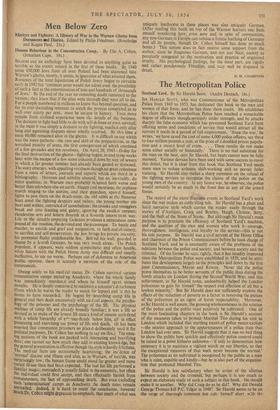Men Below Zero
uman Behaviour in the Concentration Camp. By Elie A. Cohen. (Jonathan Cape. 18s.)
ELDOM can an anthology have been devoted to anything quite so errible as the events related in the first of these books. By_ 1940 ome 650,000 Jews from all over Poland had been crammed into
arsaw's ghetto, mostly, it seems, in ignorance of what awaited them.
umours of the total liquidation of Polish Jewry began to circulate rly in 1942 but 'common sense would not admit even the possibility f such a fact as the extermination of tens and hundreds of thousands f Jews.' By the end of the year no consoling doubt remained to the ictims; they knew that if the plan went through they were all to die.
or a people numbered in millions to know this beyond question, and or its ever-dwindling remnant to watch the process completed as to
cll over ninety per cent., must be unique in history. Even more remote from civilised experience were the details of the business. The decision to fight had little to do with self-defence or even survival; in the main it was simply a decision to die fighting, reached only after long and agonising disputes never wholly resolved. By this time a mere 60,000 remained alive in the ghctto. It is difficult to say which was the more pathetic—the care and skill of the preparations, or the wretched paucity of arms, the first consignment of which consisted of a few grenades and ten revolvers. On April 20, 1943—D-day for the final destruction of the ghetto—fighting began, to end some weeks later with the escape of a few score exhaust( d Jews by way of sewers in which a far greater number had already been gassed or drowned. The story emerges, with appalling vividness though no great coherence from a mass of letters, journals and reports which are list( d in a bibliography. Heroism and nobility abound, but so, inevitably, do other qualities; in Warsaw men probably behaved both worse and better than anywhere else on earth. Happy end incurious, the orphans march singing to the station, and their guardian, spar( d himself, fights to join them on the death-train; the old rabbi at the Passover feast amid the fighting despairs and rallies; the young mother sits inert and witless, convicted of cannibalism: the crooks and smugglers break out into feasting and gaiety, ignoring the swolk n corpses; clandestine arts and letters flourish in a feverish interm.ttent way. Life in the steadily emptying Gehenna produces a miraculous com- pound of the resolute, the devoted and the picaresque. To battle and murder, to suicide and grief and resignation, to faith and chicanery, to sacrifice and self-preservation, the Jew brings his private intensity, his perennial flashy undefeatable fire. Behnd his wall, guarded in shame by a Jewish Gestapo, he was very much alone. The Polish populace, it appears, were seldom sympathetic and often hostile, while liaison with the Polish Home Army was difficult and usually ineffective, to say no worse. Perhaps out of deference to American Public opinion, there is scarcely a mention of the role of the communists.
Owing solely to his medical status, Dr. Cohen survived various concentration camps includ ng Auschwitz, where his whole family was immediately murdered and where he himself spent sixteen Months. He is deeply concerned to maintain a scientist's detachment (from which he warns the reader to watch for lapses) and 'n this he seems to have succeeded. He begins by describing camp life in general and then deals successively with mei:cal aspects, the psycho- logy of the prisoner and the psychology of the SS. The physical outlines of camp life are already broadly familiar; it was a life so devised as to make of the lowest SS man a kind of remote arch-fiend with a whole hierarchy of e-ner-fiends below him, all in effect possessing and exercising tnc power of life and death. (lt has been asserted that communist prisoners so placed deliberately used it for political purposes; Dr. Cohen has nothing to say on this.) The ensu- ing sections of the book are packed with interesting and horrifying data; one cannot say how much they add to existing knowk dge, but the general presentation is Effective though the style is hardly felicitous. The medical facts are occasionally heartening; the inc'dcnce of 'normal' disease and illness and also, as in Warsaw, of suicide, was surprisingly low; the human frame could stand far greater and more varied ill-use than had been expected. The lust for life performed a familiar magic; comradeshp usually failed in the extremity, but often the individual could first accept, and then effectually banish froth Consciousness, the fact of approaching death. But even excluding such `extermination' camps as Auschwitz the death rates remain Unrivalled. Indeed, it is hard to resist the conclusion, however Much Dr. Cohen might deprecate its emphasis, that much of what was uniquely loathsome in these places was also uniquely German. (After reading this book on top of the Warsaw horrors one finds oneself wondering how, even now and in spite of communism, any non-German in Europe can subdue a frantic loathing of Germany and all its people, though Dr. Cohen himself has done so much better.) This notion does in fact receive some support from the author, since he diagnoses German, and not just Nazi, society as peculiarly congenial to the motivation and practice of organised cruelty. His psychological findings, for the most part, arc rigidly and rather ponderously Freudian, and nay well be disputed in detail.
H. M. CHAMPNESS


































 Previous page
Previous page